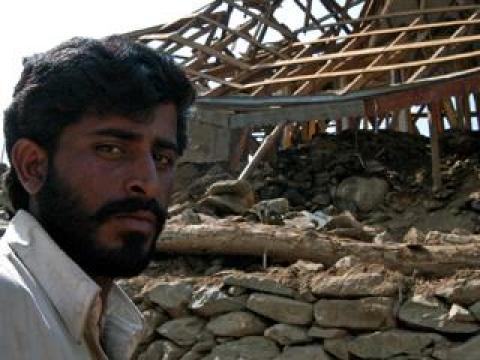Learning to love; quake crushes young couple’s dreams

Gul Mohammad Mughal, 22, was married just two years but they were the best two years of his life, the sweet time in which the two halves of an arranged marriage came to know one another and grow into love.
We had just started our life together and now it’s gone The 7.6 magnitude earthquake that shook three countries across Asia on 8 October destroyed all that. Dreams of children, the safety of a loving extended family, all of it wiped away when Gul’s wife, his sister in law, her two children and Gul’s two sisters were buried alive.
By the time the desperate men of the family reached them, all were dead. The family of 16 was suddenly only 10 and among those only two women. The joy and life’s breathe of the Mughal family has been drained away by the same quake that killed 54,000 people in Pakistan alone.
“We had just started our life together and now it’s gone,” Gul said of his dead wife.
“Marriages here are always arranged. Over time we come to love each other, to know one another. I was just beginning to understand my wife and now she is gone,” he said.
Of the quake, he said: “It was the most frightening moment in my life. The hills were shaking; rocks were crashing down the slopes. After we came out of our shock we started to think about the loss of our family members. We started crying. We didn’t eat for days.”
After we came out of our shock we started to think about the loss of our family members Gul’s therapy is work. The family must figure out how to survive with the harsh Himalayan winter approaching and almost all their food stocks destroyed. The family harvested 640 kilos of maize shortly before the earthquake. Only one bag remains.
Gul and one of his three brothers show the bag. Inside are unappetizing ears of shiny, hard corn kernels. The contents won’t last 10 people for two weeks in they eat anything near their minimum nutritional requirements.
More than 600 kilos of maize is under the debris with four dead cows. It is ruined for human consumption. The rotting carcasses stain the air with the smell of death. The family is left with four goats and some chickens.
Winter is going to strike very soon. There’s nothing left to rebuild and no time to rebuild Gul’s father, Subba, has taken control. The family lived in a sprawling house of earth, timber and corrugated roofing on a mountainside overlooking a stunning view of the steep slopes above the Bhugarmong Valley.
Subba has supervised the building of a low-slung abode of corrugated iron salvaged from the roof and propped against broken timbers. More large pieces of wood weigh down the iron sheets. The only good thing about the shelter’s cramped space is it will give its 10 occupants no choice but to huddle together, making the best use of their body heat.
“Winter is going to strike very soon. There’s nothing left to rebuild and no time to rebuild. We are thinking about moving down to the town and living in tents,” said Subba.
He has a plan: “We will have to pick up each and every stone and little piece of wood to start again. We’ll work hard to earn money and come back in the spring to rebuild.”
Two of his sons are concrete pourers and two work casually as porters. Subba is still in shock from the family’s massive loss and not considering that in winter there will be no work for his sons who range in age from eight to 35.
“We have enough land,” he said. The ruins of the family home are larger than most on this mountaintop. Subba said his family probably qualifies as middle class in this remote community.
We will have to pick up each and every stone and little piece of wood to start again The family is part of the village of Kalama, which sits at 1,911 meters (6,270 feet). World Vision staff walked here on Monday, 17 October with 40 local men who hauled 840 blankets and eight tents up 60-degree slopes.
The men had little to eat for days because the quake destroyed their food stocks but they still refused to eat, preferring to observe the Muslim daytime fast of Ramadan. The bales of 30 blankets each weighed 35 kilos (77 pounds).
Villages on the peaks and steep slopes are really extended collections of scattered homes, most within eyesight but not easy to reach. There are two homes in one alcove, four more several hundred meters away by easy trail and more still closer but less easily accessed via a steep slope.
-Ends-